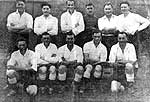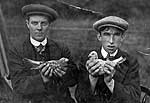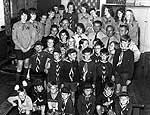Craster Village
Life, Pastimes
Jimmy Hall
 The biggest change I find in this village is, if you go out,
for instance to the harbour wall, you never see anyone, except
a stranger. In those days, every night there were men on
the harbour wall, arguing about football. Everybody had their
dinner
and walked down for a bit conversation. Everybody met at
the harbour wall, it was the same at Beadnell Square and
the kiln
at Seahouses -there were always fishermen there. The biggest change I find in this village is, if you go out,
for instance to the harbour wall, you never see anyone, except
a stranger. In those days, every night there were men on
the harbour wall, arguing about football. Everybody had their
dinner
and walked down for a bit conversation. Everybody met at
the harbour wall, it was the same at Beadnell Square and
the kiln
at Seahouses -there were always fishermen there.
Eleanor Venus
If Nancy and I went to the pictures or anything, we were
always in on the 8.15 p.m. bus. Never mind we went to the
pictures,
it was Susan Hayward and I always say it was the night we got
our roots topped. We walked down the pastures and he said he
(future husband, Ken) couldn't let me go on the 8.15pm- well
the next one was 10 p.m. We enjoyed our walk and once again Mother
and Mrs. Lumsden were there to meet us. 'Get yourself over those
fields as sharp as you like, your father's going stone mad'......
Willie Mitford
I think we had a better social life than the youngsters have
today, we used to cycle into Alnwick to the pictures. You either
walked or cycled everywhere.
Marjorie Lumsden
It was a safe place to live, we used to go to dances at Embleton,
Howick, Rennington. There were no houses here [at this end
of the village], just the Heugh, so there were loads of places
to play. We played rounders and cricket, everything, the girls
and boys all joined in.
Willie Mitford
As we got older we used to go to dances, it was the main entertainment
you had. I used to go to about four or five dances a week,
every village had a dance on a different night. We went to
Rennington, Embleton, Seahouses, Alnmouth, Brunton Aerodrome
when the RAF had it, Howick. Sometimes we had dances here.
There was a big billiard table in the hall and we used to dance
around it. I met my wife after I came out of the Army, in 1948/9,
at Newton.
Bill Curry
I was pally with Eddie Williams and Adam Durham and we weren't
made welcome in the pub at Craster, 'cos they wouldn't
speak to us some of them old fishermen. I don't know if
it was because we were young or what. It wasn't as big
as it is now. We used to go to Embleton and Newton by the Sea,
to the Joiners. I had a van, they didn't have a car, and
we used to go across there. In those days you never bothered
about drinking and driving. We went to the local dance at Embleton.
The dances used to be good - Watty Frater and his Hawaiian Serenaders......
Billy Lumsden
There's always been a football team. When the war finished that
was the best team they ever had. When all the lads came back
from the war you know. They must have had a good team earlier
when Adam Dawson played as well, 'cos he went to play for Chesterfield.
That was before the war......
Adam Dawson
 The sport in the village was football. Now we couldn't find a
pitch as you know, and we eventually found a pitch. It was
through the gate as you go to the Castle and the top fields
were quite level. Now Craster is a very old football side,
they had been playing for years and years, before we started.
We had a good side in Craster. We used to play the North Northumberland
League and there were some good teams in that league. The sport in the village was football. Now we couldn't find a
pitch as you know, and we eventually found a pitch. It was
through the gate as you go to the Castle and the top fields
were quite level. Now Craster is a very old football side,
they had been playing for years and years, before we started.
We had a good side in Craster. We used to play the North Northumberland
League and there were some good teams in that league.
Even Alnwick had three teams in that league. There was Wooler,
Amble and all districts around here. There was some good teams.
Now we had a good side. There were 4 brothers of mine who played
in the team. One season we won the North Northumberland League,
the year we won was 1927-28. I was only 16 when I played in that
team, but I was good. I was very good. (He left Craster to become
a professional player at Chesterfield). On the team was my brother
Edward, he was the goalkeeper, there was Matt Stephenson fullback,
and John Archbold, half backs were Billy Grey from Howick, Jack
Carss from Craster and an Embleton boy called Varnum. Now on
the wings were Riddell, me, my brother Ralph, Dickens inside
left, and another Varnum, brother to the other Varnum, they were
twins, and we won the league. If we were short of a player, sometimes
Sir John Craster used to come and play for us.
When that (season) was all over, we were in the Reading Room
and we were all presented with the medals and the cup from Sir
John Craster......
Neil Robson
The Craster football team used to get big crowds watching them,
even at the old pitch which was on top of the Castle field.
There would be 50 or 60 people watching and they would get
a bus to go to away games. I think I was fourteen when I first
started playing. I went to Swarland, it was a night game and
we went for a half past six kick off, they were struggling
for a team and I had to play. There were three fathers and
three sons playing then, there was Michael and Willy (Robson),
Dad and me, Les Turnbull from Embleton and his son, Michael.
I think we won as well.
I remember my Dad telling a story, they were playing Seahouses
and someone tackled a Seahouses player and broke his leg, not
intentionally, and they had to escape in the cars afterwards.
They used to bring the boats over from Seahouses when they were
playing Craster. They reckon there were once about 300 watching
a Seahouses game at Craster......
Alan Dixon
Craster Leek Club started on 21st November 1966 and
it covered Craster, Embleton, Howick and Newton by the Sea. The
first show
was in October 1967 and the total prize money then was £241/
10s / 10d. At that time the annual fees were £3 and pensioners
paid 15 shillings. The first Chairman was Billy Lumsden and he
remained in office until 1991. Paddy Raeburn was secretary for
the first two years and then George Butters was secretary until
he died in 1983. I took it on in 1985 and I am still doing the
job now......
Billy Lumsden checks his leek
bed. He has won the George Butters memorial Cup eleven times
since it was first presented in 1983.
Eddie Williams
The Pigeon Club used to have about 27 members at one time. There
were the Durham brothers, Adam's father and his Uncles
Bob and George, Tommy Simpson, Willie Harle, Freddie Watson,
George Butters and Sid Wilson (Colin's still going).
There was Dennis Dawson on the north-side. My dad had them
with his brother Geordie and when he died, about twenty year
ago, I ended up with them. Clippie had a bungalow with half
for making and mending nets and pots and the other half was
for the pigeons. Then they moved on top of the quarry......
Carol Grey
 The Pigeon Club has been in existence since about 1947, although
I think some flew in Alnwick before a club was formed here.
My father used to tell his two favourite stories; one about
Bill Archbold (Clippie) and one about George Butters. The Pigeon Club has been in existence since about 1947, although
I think some flew in Alnwick before a club was formed here.
My father used to tell his two favourite stories; one about
Bill Archbold (Clippie) and one about George Butters.
He said that George Butters, who had a droll sense of humour,
came into the shop one Friday morning after the Racing Pigeon
Weekly magazine had arrived. Dad said to George that there was
a grand scraper advertised in the Racing Pigeon, but that it
was a bit expensive - about £4- a lot of money. Dad
said just hesitated a second or two, then replied, 'it
doesn't gan itsel does't? '
Doris Clarke
I joined the Guides in 1940. We used to go to Curry's hut at
the Guides along there. It was a shed - it's just for storage
now, down on the farm. We used to walk over this back way.
I remember who ran the guides, she was called Miss Barbara
Nichol.
I can remember coming to services in the village, the Sunday
school being involved. You used to go to the Tower and pick the
snowdrops for Mothering Sunday. There were Scouts here, and they
were just ticking over, with the two Greenley boys, and their
father who used to take them to Seahouses and the girls used
to say there was nothing for girls. So when she got to about
12 years old, I said to Pauline, we'll see what interest there
is. So we had a meeting and there was about 14 turned up. So
we started the Guides here......
Joan Angus
 There
was a tragedy with the scouts that happened on the 6th August
1931, the year before I was born. The scouts went off
to camp with Percy Adams, who had founded the first Embleton
Group, on moving to the area two years previously. I believe
he was the curate.
They were camping at Norham on the River Tweed and arrived on
the 3rd August. On the Thursday following at 12 o'clock,
Albert Butters was playing around the edge of the river, with
all the other scouts. He being the adventurous type, he waded
deeper, although he couldn't swim. Desmond, who was looking
on, heard a scream as Albert got into difficulties and watched
frantically as William Butters who could not swim, ran into the
water to aid him. He grasped hold of him to hold him up and at
this point Percy Adams, who was in a boat nearby, had seen the
commotion, and he dived overboard to swim to them, but on reaching
them he too was pulled under by a strong current. There
was a tragedy with the scouts that happened on the 6th August
1931, the year before I was born. The scouts went off
to camp with Percy Adams, who had founded the first Embleton
Group, on moving to the area two years previously. I believe
he was the curate.
They were camping at Norham on the River Tweed and arrived on
the 3rd August. On the Thursday following at 12 o'clock,
Albert Butters was playing around the edge of the river, with
all the other scouts. He being the adventurous type, he waded
deeper, although he couldn't swim. Desmond, who was looking
on, heard a scream as Albert got into difficulties and watched
frantically as William Butters who could not swim, ran into the
water to aid him. He grasped hold of him to hold him up and at
this point Percy Adams, who was in a boat nearby, had seen the
commotion, and he dived overboard to swim to them, but on reaching
them he too was pulled under by a strong current.
One of the seven remaining scouts ran to the 18th, 19th and
24th Midlothian Girl Guides which was about 200 yards away to
obtain help, whilst the other 6 stood on the bank, powerless
to help. When the Guides arrived, Miss Stewart, the leader, organized
two girls who were strong swimmers to swim into the area, and
look to see if they could find them. They couldn't find
the boys or Percy Adams. Eventually the police arrived and at
that point Miss Stewart sent the guides back to their camp and
she took charge of the 7 remaining scouts, and drove them back
to Craster. |




 The biggest change I find in this village is, if you go out,
for instance to the harbour wall, you never see anyone, except
a stranger. In those days, every night there were men on
the harbour wall, arguing about football. Everybody had their
dinner
and walked down for a bit conversation. Everybody met at
the harbour wall, it was the same at Beadnell Square and
the kiln
at Seahouses -there were always fishermen there.
The biggest change I find in this village is, if you go out,
for instance to the harbour wall, you never see anyone, except
a stranger. In those days, every night there were men on
the harbour wall, arguing about football. Everybody had their
dinner
and walked down for a bit conversation. Everybody met at
the harbour wall, it was the same at Beadnell Square and
the kiln
at Seahouses -there were always fishermen there. The sport in the village was football. Now we couldn't find a
pitch as you know, and we eventually found a pitch. It was
through the gate as you go to the Castle and the top fields
were quite level. Now Craster is a very old football side,
they had been playing for years and years, before we started.
We had a good side in Craster. We used to play the North Northumberland
League and there were some good teams in that league.
The sport in the village was football. Now we couldn't find a
pitch as you know, and we eventually found a pitch. It was
through the gate as you go to the Castle and the top fields
were quite level. Now Craster is a very old football side,
they had been playing for years and years, before we started.
We had a good side in Craster. We used to play the North Northumberland
League and there were some good teams in that league.
 The Pigeon Club has been in existence since about 1947, although
I think some flew in Alnwick before a club was formed here.
My father used to tell his two favourite stories; one about
Bill Archbold (Clippie) and one about George Butters.
The Pigeon Club has been in existence since about 1947, although
I think some flew in Alnwick before a club was formed here.
My father used to tell his two favourite stories; one about
Bill Archbold (Clippie) and one about George Butters. There
was a tragedy with the scouts that happened on the 6th August
1931, the year before I was born. The scouts went off
to camp with Percy Adams, who had founded the first Embleton
Group, on moving to the area two years previously. I believe
he was the curate.
They were camping at Norham on the River Tweed and arrived on
the 3rd August. On the Thursday following at 12 o'clock,
Albert Butters was playing around the edge of the river, with
all the other scouts. He being the adventurous type, he waded
deeper, although he couldn't swim. Desmond, who was looking
on, heard a scream as Albert got into difficulties and watched
frantically as William Butters who could not swim, ran into the
water to aid him. He grasped hold of him to hold him up and at
this point Percy Adams, who was in a boat nearby, had seen the
commotion, and he dived overboard to swim to them, but on reaching
them he too was pulled under by a strong current.
There
was a tragedy with the scouts that happened on the 6th August
1931, the year before I was born. The scouts went off
to camp with Percy Adams, who had founded the first Embleton
Group, on moving to the area two years previously. I believe
he was the curate.
They were camping at Norham on the River Tweed and arrived on
the 3rd August. On the Thursday following at 12 o'clock,
Albert Butters was playing around the edge of the river, with
all the other scouts. He being the adventurous type, he waded
deeper, although he couldn't swim. Desmond, who was looking
on, heard a scream as Albert got into difficulties and watched
frantically as William Butters who could not swim, ran into the
water to aid him. He grasped hold of him to hold him up and at
this point Percy Adams, who was in a boat nearby, had seen the
commotion, and he dived overboard to swim to them, but on reaching
them he too was pulled under by a strong current.